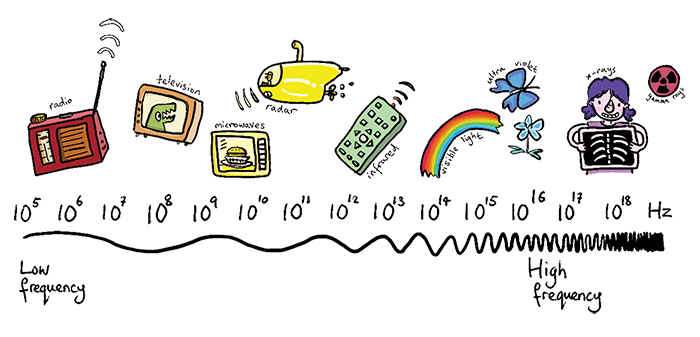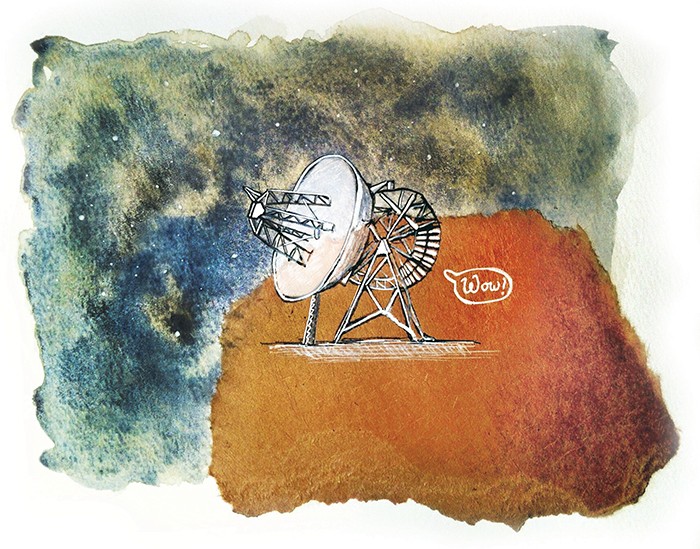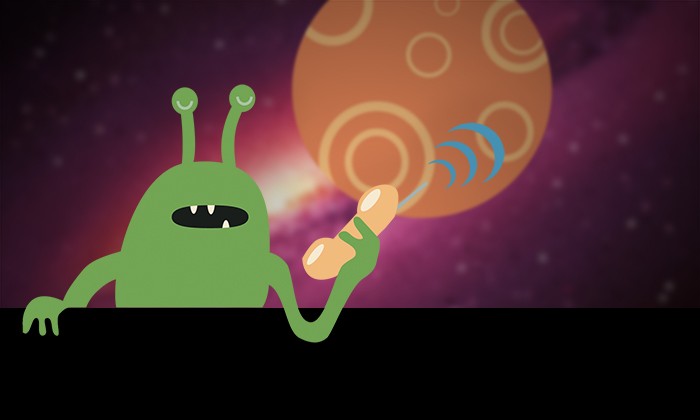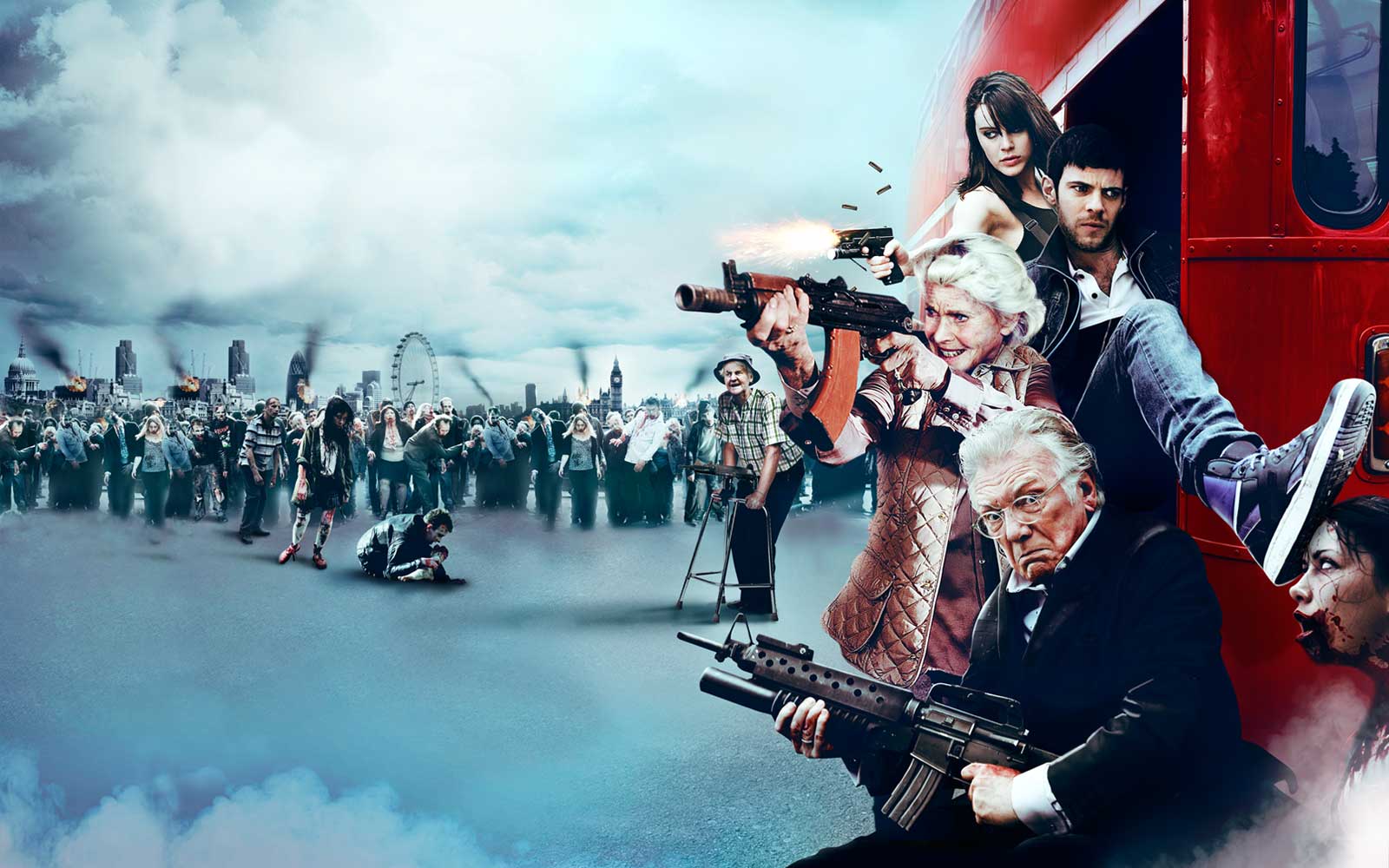There are over 100 billion galaxies in our universe. Each galaxy has billions of stars. Each star could have a planet. Planets can breathe life. Alessio Magro writes about his experience hunting for E.T. Illustrations by Sonya Hallett
In 1982, 4 years before I was born, the world fell in love with Spielberg’s E.T. the Extra-Terrestrial. Fifteen years later, the movie Contact, an adaptation of Carl Sagan’s novel, hit the big screen. Although at the time I was too young to appreciate the scientific, political, and religious themes I was captivated and it fired my thoughts. I questioned whether we are alone in this vast space. What would happen if E.T. does call? Are we even listening? If so, how? And, is it all a waste of time and precious money? Instead of deflating me, these questions inspired me to start a journey that led me to my collaboration with SETI, the Search for Extra Terrestrial Intelligence. I participated in ongoing efforts to try and find intelligent civilisations on other worlds.
The debate on whether we are alone started ages ago. It was first debated in Thales, Ancient Greece. Only recently has advanced technology allowed us to try and open up communication channels with any existing advanced extraterrestrial civilisations. If we do not try we will never answer this question.
For the past fifty years we have been scanning the skies using large radio telescopes and listening for signals which cannot be generated naturally. The main assumption is that any advanced civilisation will follow a similar technological path as we did. For example, they will stumble upon radio communication as one of the first wireless technologies.
SETI searches are usually in the radio band. Large telescopes continuously scan and monitor vast patches of the sky. Radio emissions from natural sources are generally broadband, encompassing a vast stretch of the electromagnetic spectrum — waves from visible light to microwaves and X-rays — whilst virtually all human radio communication has a very narrow bandwidth, making it easy to distinguish between natural and artificial signals. Most SETI searches therefore focus on searching for narrow band signals of extraterrestrial origin.
Narrow bands are locked down by analysing a telescope’s observing band — the frequency range it can detect. This frequency range is broken down into millions or billions of narrow frequency channels. Every channel is searched at the same time. SETI searches for sharp peaks in these small channels. This requires a large amount of computational resources, such as supercomputing clusters, specialised hardware systems, or through millions of desktop computers. The infamous SETI@home screen-saver extracted computer power from desktops signed up to the programme, which started as the millennium turned.
E.T. civilisations might also transmit signals in powerful broadband pulses. This means that SETI could search for wider signal frequencies. However, they are more difficult to tease apart from natural emissions, so they require more thorough analysis. The problem is that as broadband signals — natural or otherwise — travel through interstellar space they get dispersed, resulting in higher frequencies arriving at the telescope before lower ones, even though they both were emitted at the same time. The amount of dispersion, the dispersion gradient, depends on the distance between the transmitter and receiver. The signal can only be searched after this effect is accounted for by a process called dedispersion. To detect E.T. signs, thousands of gradients have to be processed to try out all possible distances. This process is nearly identical to that used to search for pulsars, which are very dense, rapidly rotating stars emitting a highly energetic beam at its magnetic poles. Pulsars appear like lighthouses on telescopes, with a regular pulse across the entire observation band.
For the past four years I have been developing a specialised system which can perform all this processing in real-time, meaning that any interesting signals will be detected immediately. Researchers now do not need to wait for vast computers to process the data. This reduces the amount of disk space needed to store it all. It also allows observations to be made instantaneously, hence reducing the risk of losing any non-periodic, short duration signals. To tackle the large computational requirements I used Graphics Processing Units (GPUs) — typically unleashed to work on video game graphic simulations — because a single device can perform tasks of at least 10 laptops. This system can be used to study pulsars, search for big explosions across the universe, search for gravitational waves, and for stalking E.T..

E.T. we love you
Hunting for planets orbiting other stars, known as exoplanets, has recently become a major scientific endeavour. Over 3,500 planet-candidates were found by the Kepler telescope that circles our planet, about 961 are confirmed. Finding so many planets is now leading scientists to believe that the galaxy is chock-full of them. The current estimate: 100 billion in our galaxy, with at least one planet per star. For us E.T. stalkers, this is music to our ears.
Life could be considered inevitable. However, not all planets can harbour life, or at least life as we know it. Humans need liquid water and a protective atmosphere, amongst other things. Life-supporting planets need to be approximately Earth-sized and orbit within its parent star’s habitable zone. This Goldilocks zone is not too far away from the sun, freezing the planet, or too close to it, frying it. These exoplanets are targeted by SETI searches, which perform long duration observations of exoplanets similar to Earth.
“The big question is: where do we look for E.T.? I would prefer rephrasing to: at which frequency do we listen for E.T.?”
By focusing on these planets, SETI is gambling. They are missing huge portions of the sky to focus on areas that could yield empty blanks. SETI could instead perform wide-field surveys which search large chunks of the sky for any interesting signals. Recent development in radio telescope technology allows for the instantaneous observation of the entire sky, making 24/7 SETI monitoring systems possible. Wide-field surveys lack the resolution needed to figure out where a signal would come from, so follow-up observations are required. Anyhow, a one-off signal would never be convincing.
For radio SETI searches, the big question is: where do we look for E.T.? I would prefer rephrasing to: at which frequency do we listen for E.T.? Imagine being stuck in traffic and you are searching for a good radio station without having a specific one in mind. Now imagine having trillions of channels to choose from and only one having good reception. One would probably give up, or go insane. Narrowing down the range of frequencies at which to search is one of the biggest challenges for SETI researchers.
The Universe is full of background noise from naturally occurring phenomena, much like the hiss between radio stations. Searching for artificial signals is like looking for a drop of oil in the Pacific Ocean. Fortunately, there exists a ‘window’ in the radio spectrum with a sharp noise drop, affectionately called the ‘water hole’. SETI researchers search here, reasoning that E.T. would know about this and deliberately broadcast there. Obviously, this is just guesswork and some searches use a much wider frequency range.
Two years ago we decided to perform a SETI survey. Using the Green Bank Telescope in West Virginia (USA), the world’s largest fully steerable radio dish, we scanned the same area the Kepler telescope was observing whilst searching for exoplanets. This area was partitioned into about 90 chunks, each of which was observed for some time. In these areas, we also targeted 86 star systems with Earth-sized planets. We then processed around 3,000 DVDs worth of data to try and find signs of intelligent life. We developed the system ourselves at the University of Malta, but we came out empty handed.
A camera shy E.T.
Should we give up? Is it the right investment in energy and resources? These questions have plagued SETI from the start. Till now there is no sign of E.T., but we have made some amazing discoveries while trying to find out.
Radio waves were discovered and entered into mainstream use in the late 19th century. We would be invisible to other civilisations unless they are up to 100 light years away. Light (such as radio) travels just under 9.5 trillion kilometres per year. Signals from Earth have only travelled 100 light years, broadcasts would take 75,000 years to reach the other side of our galaxy. To compound the problem, technology advances might soon make most radio signals obsolete. Taking our own example, aliens would have a very small time window to detect earthlings. The same reasoning works the other way, E.T. might be using technologies which are too advanced for us to detect. As the author Arthur C. Clarke stated, ‘any sufficiently advanced technology is indistinguishable from magic’.

At the end of the day, it is all a probability game, and it is a tough one to play. Frank Drake and Carl Sagan both tried. They came up with a number of factors that influence the chance of two civilisations communicating. One is that we live in a very old universe, over 13 billion years old, and for communication between civilisations their time windows need to overlap. Another factor is, if we try to detect other technological signatures they might also be obsolete for advanced alien life. Add to these parts, the assumed number of planets in the Universe and the probability of an intelligent species evolving. For each factor, several estimates have been calculated. New astrophysical, planetary, and biological discoveries keep fiddling with the numbers that range from pessimistic to a universe teeming with life.
The problem with a life-bloated galaxy is that we have not found it. Aliens have not contacted us, despite what conspiracy theorists say. There is a fatalistic opinion that intelligent life is destined to destroy itself, while a simpler solution could be that we are just too damned far apart. The Universe is a massive place. Some human tribes have only been discovered in the last century, and by SETI standards they have been living next door the whole time. The Earth is a grain of sand in the cosmic ocean, and we have not even fully explored it yet.
“Signals from Earth have only travelled 100 light years, broadcasts would take 75,000 years to reach the other side of our galaxy”
Still, the lack of alien chatter is troubling. Theorists have come up with countless ideas to explain the lack of evidence for intelligent alien existence. The only way to solve the problem is to keep searching with an open mind. Future radio telescopes, such as the Square Kilometre Array (SKA), will allow us to scan the entire sky continuously. They require advanced systems to tackle the data deluge. I am part of a team working on the SKA and I will do my best to make this array possible. We will be stalking E.T. using our most advanced cameras, and hopefully we will catch him on tape.
[ct_divider]
Carl Sagan’s Cosmos
Exoplanets Galore















